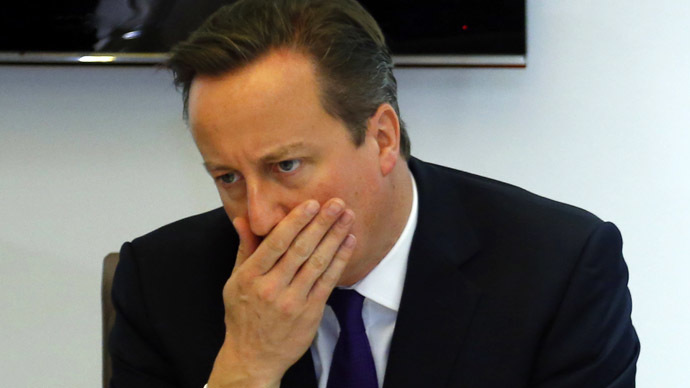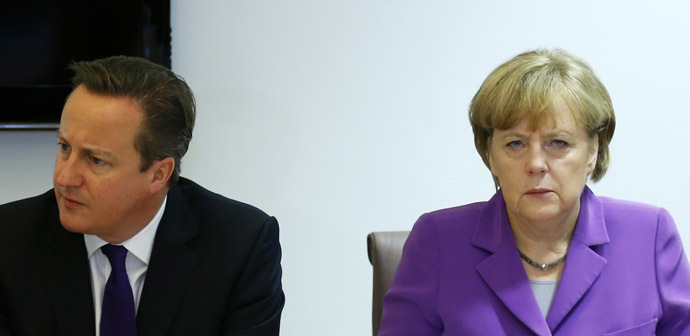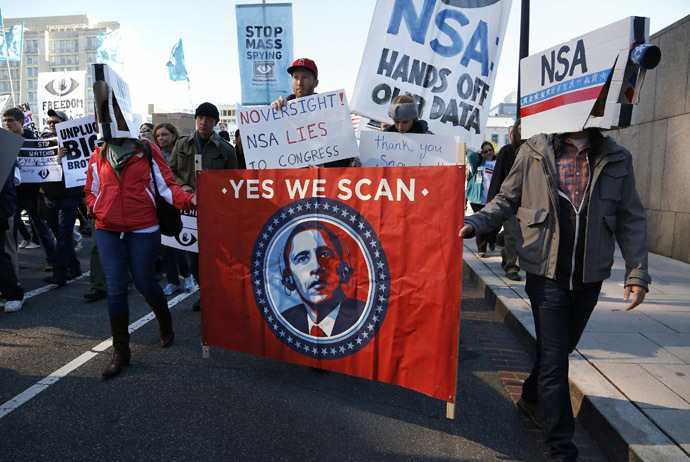US Trojan horse: NSA scandal shows Europe would be better off without Britain

Like the curious incident of the dog that didn’t bark in the nighttime in the classic Sherlock Holmes story Silver Blaze, the most revealing thing about the latest NSA spying revelations which made world headlines last week was the non-barking of the UK.
While leading politicians of
other European countries and officers of the EU itself were keen
to express their concern over the latest revelations of US spying
on its allies – the President of the European Parliament Martin
Schulz said that US secret services were ‘out of control’
– British Prime Minister David Cameron has only said that he
thought that the EU statement on the matter was ‘good and
sensible’ and that he agreed with it. German Chancellor
Angela Merkel said Cameron ‘silently acquiesced” to the
statement. At a press conference, Cameron refused to comment
about the recent NSA revelations.
The muted British reaction to what is a truly outrageous scandal, is proof, if indeed any further proof were needed, of what Britain's main role in the EU is: to act as a Trojan horse to defend and further the interests of the government of the United States of America.
The great French leader Charles de Gaulle twice vetoed Britain's application to join the EEC (European Economic Community), (the forerunner to today’s EU) not because he was anti-British but because he feared that allowing Britain to join would tantamount to letting America in. In January 1963, he famously declared that allowing Britain to join would lead to a “colossal Atlantic community dependent on and led by America, which would soon absorb the European Community.”
The irony is that the UK political elite today is far more slavishly pro-US than our leaders were in the 1960s. Back then British Prime Ministers did stand up to America from time to time, even though we were still paying back war-debt to the US. Labour’s Harold Wilson refused to send British troops to Vietnam. The Conservative Edward Heath defied pressure from the US to stay neutral during the 1973 Yom Kippur War between the Arab states and Israel and imposed an arms embargo on all combatants. In sharp contrast with today’s Conservative party leadership, Heath refused to allow US intelligence gathering from British bases in Cyprus.
Today, however, Britain’s leaders are totally subservient to Washington.
In fact loyalty to the American Empire and an unquestioning commitment to Atlanticism has become a necessary condition for anyone wanting to climb to the top of the greasy pole in British politics or gain entry into the UK establishment. Stated support for the US’s closest Middle East ally, Israel, is a big help too.

Any politicians who want Britain to be genuinely independent of the US and follow its own foreign policy path, like Tony Benn, who stood for deputy leadership of the Labour Party in the early 1980s, or George Galloway, the leader of Respect, have faced years of smears and attacks- and are routinely portrayed by the UK political elite and media gatekeepers as dangerous ‘extremists’.
But the real ‘extremists’ are those UK neocon Atlanticists who enthusiastically supported Britain’s role in the illegal US-led invasion of Iraq – a war based on a blatant lie about WMDs, and which according to a new study, has led to the death of nearly 500,000 people.
It’s embarrassing to see just how far ambitious British politicians are willing to go to suck up to the super-power. In 2010, WikiLeaks exposed how leading members of the Conservative Party, when in opposition, had pledged their allegiance to the US Empire and offered ‘unparalleled help’ in promoting American aims, if and when they took power.
Even the American diplomats were amused at just how sycophantic the Brits were.
The British government, full of loyal Atlanticists, will now be doing all it can to make good its promises and prevent the latest spying crisis having any long-term consequences.
Cameron had no option but to ‘silently acquiesce’ to the EU statement, but don’t expect any vocal criticism of Uncle Sam‘s snooping on its allies from the country that’s helped that snooping. Britain will be working flat out to block any beefing up of EU data protection laws and the British government will do all it can to make sure the EU/US free trade deal goes ahead. The importance of the role of the UK in speaking up for American interests in Europe is fully appreciated in Washington.
"We welcome an outward-looking EU with Britain in it. We want to see a strong British voice in that European Union. That is in the American interest,” declared Philip Gordon, US assistant secretary for European affairs, earlier this year.
We hear a lot in the UK on whether Britain should pull out of the EU. There’s certainly a strong case for saying that the EU would be much better off without its American Trojan horse.

Although there are some hardcore Atlanticists in other European countries too, without Britain there'd be more of a chance of Europe edging away from its close relationship with the US. While everyone acknowledges the role that the US, along with Britain and the Soviet Union, played in defeating the Nazis and liberating Europe in the 1940s, it's hard to think of any benefits for Europe that the alliance with the US has brought it in the past 20 years. Since the end of the ‘Cold War', Europe has been dragged into US-led wars and European citizens have been put at risk from terrorism due to aggressive neocon-inspired US foreign policy.
There are plenty of examples where European countries have acted against their best interests in caving in to US pressure. In 2012, an EU-wide oil embargo on Iran was imposed – the one thing that European countries didn’t need with so many economies deep in recession. The move made the US government happy, and made the pro-Israel lobby in the US happy, but it made European citizens worse off – particularly in Greece, Spain and Italy, countries which imported a sizeable proportion of their oil from Iran.
The latest example of Britain pushing the US cause in Europe came only this summer, when the UK, supported by the ‘liberal interventionists’ in France, bullied the EU into lifting its arms embargo on the Syrian opposition. Again, in what way is working to forcibly toppling a secular Middle Eastern government - which has never threatened Europe and which is fighting against extremist Islamic terrorist groups - in the interests of Europe and its citizens?
Hopefully these new spying revelations will lead to a reset in US/EU relations, which would greatly benefit ordinary people in Europe and the US.
The biggest obstacle to this happening, however, is Britain, the country whose job it is to make sure that the EU stays loyal to Washington, regardless of the harm this does to Europe.
Fifty years on from his first veto of Britain’s application to join the EEC, Charles de Gaulle’s fears have proved to be very well-founded.
The statements, views and opinions expressed in this column are solely those of the author and do not necessarily represent those of RT.
The statements, views and opinions expressed in this column are solely those of the author and do not necessarily represent those of RT.












